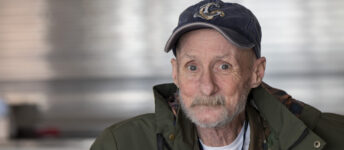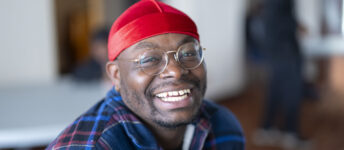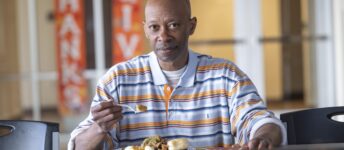Eugene
The Union Mission saved Eugene’s life. Simple as that.

“Simple as that.”
Spend any time in conversation with Eugene, and you’ll hear that phrase a number of times. It’s his way of underscoring something he’s just said, of making a point.
It could be something relatively insignificant, like when he changed job descriptions while working in the hotel industry: “I went from setting up banquets to working security. Simple as that.”
It might be something much more consequential, like when he was deep in the throes of alcoholism:
“When I went drinking, I gave the term ‘binge’ a whole new meaning…
…Simple as that.”
Or it might be something literally life-changing: “If it weren’t for The Union Mission, I’d be dead. Simple as that.”
But of course, no one’s life story is “simple as that.” And that certainly includes Eugene, whose 73 years have been highlighted by a wide variety of experiences that ultimately led him to the Mission…and a shot at new life.
An Addictive Personality
Eugene grew up in a fatherless home in what he calls “the ghetto” of East St. Louis. But he was showered with love by his single mom, who worked two jobs to support the family. “I was happy as a kid,” he says.
At Assumption High School, an all-boys Catholic school, Eugene was one of just eight African Americans out of 1,200 students. He was on the football and track teams, and says his coaches were like father figures. “They took me under their wing,” he says. “They gave me one-on-one attention and taught me values that assisted me in life.”
After playing a year of college football as a defensive cornerback, Eugene felt a new calling: To be a cop. Law enforcement ran strong in his family and among his friends. He served on the East St. Louis police force for about 12 years, where he says he “saw everything, even some things I didn’t want to see.” The most gruesome mental images and experience never leave your memory, he says. When he hung up his badge, he was looking for something new. His sister had married a Navy guy and said, “Come to Norfolk. You’ll like it. There’s hardly ever any snow here.”
Eugene moved to Virginia and got a job at the Norfolk Naval Shipyard, then at a few other contractors for a while before going into the hotel industry. He was married for a decade, but after he retired, he lived alone. He’d always been a “sociable drinker,” but when his mother died, “I became very depressed. That’s when I found out I have what they call an addictive personality.
“I couldn’t drink just one or two beers. That’s wasting my time. If I couldn’t go with three 6-packs or a case, ain’t no point in messing around. I would even throw in a couple bottles of wine in addition that.”
Eugene realized he had an alcohol problem when he was lining up at the liquor store at 6:50 a.m. to be there when it opened at 7:00. “I’d drink all day,” he says. “And sometimes all night.” His alcoholism, ironically, sometimes got the former police officer in trouble with the law. There was a DUI, and when he felt challenged, belittled, or disrespected, Eugene had his share of fights. One night while intoxicated at home, he fell and fractured a few ribs.
While recovering in the hospital, he decided he’d had enough. “It got to the point where I said, ‘Look here, I got to do something,’” Eugene says. “I can’t continue like this.”
“I got sick and tired of being sick and tired. Simple as that.”
Called By His Name
A case manager at his physical rehab unit had recommended The Union Mission, and that sounded like a good idea to Eugene. It wasn’t long after his arrival that he realized there was something very special about the place. “On my first day here, they remembered my name,” he says.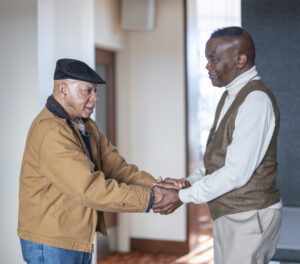
“I’d only been here a few hours and somebody called me by name. That means a lot!”
They remembered my name . . .
“Fear not, for I have redeemed you; I have called you by name, you are mine.” God’s words, through the prophet Isaiah, came very much alive for Eugene on that first day at The Mission.
Eugene says it rekindled a faith that had faded over the years. “I believed in God,” he says, “but only prayed when there was something really desperate. Like, ‘Lord, please just get me past this, and I won’t do it again.’ Then when things got better . . . well, there you go.”
At the Mission, Eugene met a God of grace, one who doesn’t have to be bargained with, one whose mercies are new every morning.
“I’ve learned to submit to God,” Eugene says.
He credits the Mission’s staff with helping him in that process. “They’re phenomenal. They will work with you as long as you’re willing to be worked with.”
“You can’t fool them,” he continues. “They’ve seen it all. And some of them have been through what I’ve been through. Been there, done that, wrote the book, bought the T-shirt. And that’s what I like about them. Simple as that.”
Eugene “walked the line” here at the Mission, saved up his Social Security, and was able to move into a TBRA apartment. He loves living independently again. And he’s confident he’ll maintain his sobriety—thanks to the Mission and his dependence on God. “I’m going to make it this time. I have nothing to hold me back.”
“I thank God for The Union Mission,” he says. “Without them, I’d be dead, on the streets…. 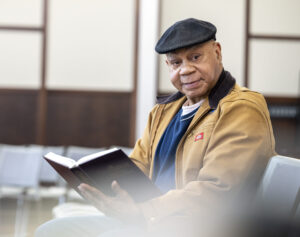
“The Union Mission put me on a new mission:
Think before you act. Remember what got you here. Don’t repeat your old mistakes. A little prayer helps a lot. Simple as that.”
Simple as that.
— with Mark Moring for The Union Mission

